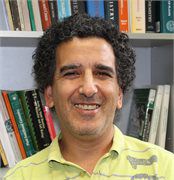
IGI Seminar Series: Recombining Genomes and Alleles for Zooming in on Adaptive Value of Clock Rhythmicity in Barley
Event Details
Add to Calendar
Location
https://berkeley.zoom.us/j/94188083950
Subscribe to our calendar to stay up to date on all our events.
Summary
Join us to learn about genetic solutions for crop yields that have been impacted by the current and near-future effects of global warming. This seminar, led by Eyal Fridman in the Plant Sciences Institute at the Agricultural Research Organization (ARO) in Isreal, will cover his research on naturally occurring nucleotype and plasmotype variation within barley (Hordeum vulgare and wild ancestor H. spontaneum) as a model system. He will also show how his lab integrates genomics and high-throughput phenomics analysis for circadian clock and life history phenotypes to find new gene alleles underlying adaptation to heat and drought. Later, he will discuss how they are developing and implementing RECAS9, a CRISPR/CAS9-mediated QTL mapping, and also describe new, exciting results from exploring cytonuclear interactions and their impact on clock and fitness plasticity in new interspecific wild-cultivated populations. The seminar will also cover two new collaborative projects with UC Berkeley and UC Riverside that aim to recombine plasmotype and nucleotype alleles by classic and genome editing approaches and test their impact on barley yield in Israeli and California fields. Read more about his research here.
Join us for the live event on Zoom. All participants and hosts are required to sign into a Zoom account prior to joining meetings.
Speaker
